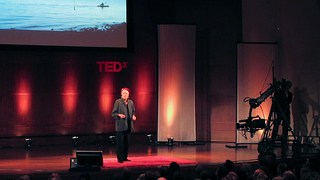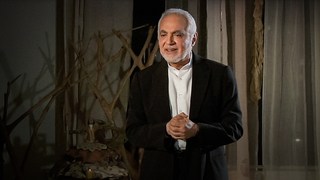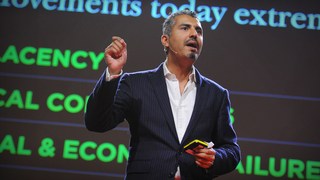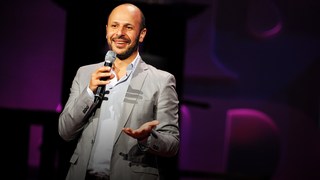Summary analysis
After watching the collection of talks on Understanding Islam, read a thoughtful recap of the major points in this TED Study, and learn where experts believe things are headed.
Where next?
The greatest challenge to any religion is getting its followers to act in accordance with its principles. As Imam Faisal Abdul Rauf and Karen Armstrong described in their TEDTalks, Islam's primary values are compassion and justice — values they share with their sister religions, Judaism and Christianity. If people really did act in accordance with these values, it could well be argued that we wouldn't need organized religion in the first place; the fact that people violate their religious principles with sometimes astonishing regularity might be what makes religion necessary.
But Muslims face a double challenge. At the same time as they struggle to understand and follow their religion's teachings, they have to contend with prejudice, contempt, and outright hostility. A significant, recent example: In 2012, YouTube allowed the global promulgation of a video depicting Muhammad as a bastard; a bestial, lecherous, "murdering thug;" a buffoon who orders the torture of a 120 year-old woman and declares that everyone must "pay extortion or die."
Recognizing that such displays are meant to cause profound insult and provoke reaction, Muslim leaders strenuously cautioned restraint. Leading Egyptian scholar Yusuf al-Qaradawi joined with other Muslim authorities calling for legal action against what is understandably perceived as hate speech. In a sermon three days after the killing of U.S. Ambassador to Libya Christopher Stevens, al-Qaradawi said:
Throwing stones at embassies and setting fire to them is not faithfulness, nor is killing an ambassador, along with the people with him. This should not be our approach. Absolutely not. The U.S. is not behind this...We do not want the nations to learn to curse; we want them to learn virtue and manners. That is what we should be teaching the world, as well as our own nation.
Shortly after the furor over the YouTube video, a French magazine published similarly disrespectful cartoons of Muhammad. The leader of the French Muslim Council (CFCM), Mohammed Moussaoui, appealed to French Muslims not to engage in public protests, warning that such protests would be counterproductive. Egypt's highest Islamic authority Ali Gomaa issued a statement reminding Muslims that Muhammad's example was to endure personal attacks without retaliation. "There is no doubt that, since the Prophet is our greatest example in this life, this should also be the reaction of all Muslims." Yet quite predictably, protests have exploded in violence in many areas around the world, particularly those most challenged by lack of educational, economic, and political access.
More broadly, as we have seen with the ongoing revolutions in the Middle East, Muslim-majority countries are struggling to recover from centuries of colonial domination and decades of post-colonial mismanagement by non-representative rulers. The struggle is ongoing and successes have occurred only recently. As TED speaker Mustafa Aykol noted, Turkey was the first to establish democratic rule, but the transition to representative democracy was difficult and protracted. Military coups disrupted the process four times during the second half of the 20th century, and human and civil rights, including minority rights, continue to be problematic. It was only in 2002 that a party with an Islamist identity gained electoral victories. As we saw above, the AKP retains its widespread popularity in Turkey, and it is often seen as a model for other Muslim-majority countries attempting to integrate their Islamic values and identity with modern political systems.
The role of Sharia
The key issue is the role of Islamic law — Sharia — in public life. For many people, Sharia means court-ordered amputations, stonings in the public square, and restrictions on individual liberties. For the majority of Muslims who try to follow Islamic law, Sharia means living in accordance with the will of God as they understand it. For those attempting to establish democracies in Muslim-majority countries, Sharia is a set of ideals that must be instrumentalized in ways that make them effective in achieving justice in today's diverse society.
Throughout Islamic history, Sharia has provided the framework for both private and public life. It encompasses the basic practices of Islam, revealed in the Qur'an and exemplified by the Prophet Muhammad (the Sunna), as well as the laws that are derived from those sources. The core religious practices remain stable, such as daily prayer, annual fasting, and pilgrimage. But the laws derived from the Qur'an and Muhammad's example change over time and display significant diversity. The Qur'an does contain some specific legislation, such as regulation of inheritance, for example. Many authorities believe that such regulations are not subject to interpretation. But the majority of the Qur'an's teachings are in the form of moral guidance and recommendations, which require human effort to be put into specific law codes.
Discussion of just what form those specific regulations should take in the modern world has dominated Islamic discourse over the past century. During the period of European domination, the discussion remained largely hypothetical since the colonial powers had replaced Islamic law with European codes in all areas of public law. But now that Muslim majorities are gaining the right to legislate for themselves, the discussion of the role of Sharia in public life has gained greater urgency.
Of particular concern to both Muslims and non-Muslims are laws concerning the rights of women and minorities. The majority of Islamic thinkers in Tunisia and Egypt, for example — the countries that, liberated from longstanding postcolonial authoritarian rule, recently elected Islamist-dominated governments — endorse equality of all citizens. Leading Egyptian Islamist Fahmi Huwaidi bases his arguments on Islam's overall goal of justice. He says that in order to achieve justice in today's world, democracy is essential: it has been shown to be successful in the West, and it is a reflection of the Qur'an's command to govern through consultation (shura). The right to choose the ruler, Hawaidi contends, must thus be shared equally by all citizens — Muslim and non-Muslim, male and female.
The leader of the Islamist party that dominated Tunisia's 2011 elections, Rachid al-Ghannouchi, expresses the same sentiment. Like other reformers, al-Ghannouchi cites Sharia's own requirements: the preservation of the human rights of life, religion, family, property, and reason or dignity. These are rights that must be shared by all citizens in a state characterized by Islamic governance.
The success of candidates from parties supporting these views in free elections indicates the popularity of these positions among the majority of Muslims participating in the elections. Support for democracy, pluralism, and human rights among Muslims is also demonstrated in recent global surveys such as those conducted by Gallup and Pew.
Yet, as in all communities, there remains diversity of opinion regarding these and other contentious issues, such as freedom of expression. Approximately one out of five people on earth is Muslim. They share no single culture. Muslims comprise the second or third largest minorities in Europe and the Americas. There are Muslim members of British parliament, the U.S. Congress, the French cabinet, and the Israeli Knesset. Muslims trace their presence in Latin America to Columbus's voyages, and the Chinese Muslim community — 1-2% of China's population — traces its history to the seventh century. Within all these communities there are people of diverse levels of education, experience, and opinion. Generalizations about Muslims in general, therefore, can be no more detailed than generalizations about global Christian communities. But as specific Muslim communities gain the right to shape their destinies through democracy, the world will no doubt be watching the challenging transition from ideal values to practical realities.





